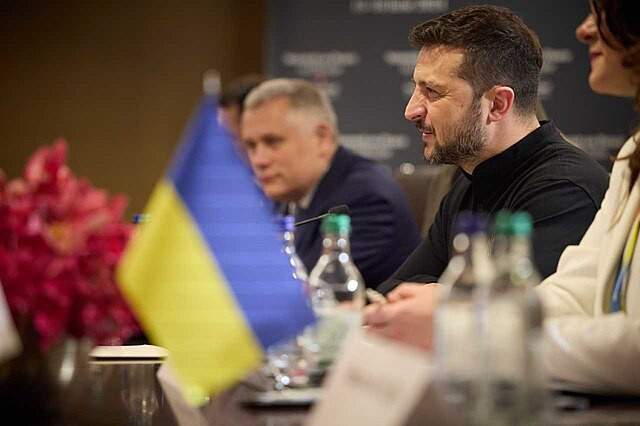The White House has suggested that Ukrainian President Volodymyr Zelensky should "leave for France" and allow new leadership to take over in Ukraine, as tensions between Washington and Kyiv escalate amid ongoing Russia peace talks and disputes over critical mineral agreements.
Sources within President Donald Trump's administration have reportedly expressed growing frustration with Zelensky, with some insiders stating that his departure would be in Ukraine's best interest. "I heard months ago it's time for an election and new leadership," a White House source told the New York Post. Another insider suggested that "the best case for [Zelensky] and the world is that he leaves to France immediately."
Rising Disputes Over Military Aid and Critical Minerals
At the center of the latest dispute is a proposed deal involving Ukraine's vast deposits of rare earth minerals. Trump has pressured Kyiv to sign an agreement that would allow U.S. firms to take a 50% stake in Ukraine's mineral wealth-valued at approximately $500 billion-as compensation for the military aid provided by the U.S. since Russia's invasion in 2022.
Zelensky initially rejected the deal, calling it "not in the interests of a sovereign Ukraine," but later appeared to soften his stance, signaling a potential willingness to negotiate. However, Trump and his advisors have remained critical of Zelensky's approach. Speaking at a White House briefing, National Security Adviser Mike Waltz said, "President Trump is obviously very frustrated right now with President Zelensky."
He added that the U.S. had presented Ukraine with "an incredible and historic opportunity" to secure economic investment and strengthen its security ties with the U.S., arguing that such a deal would be "much more than another pallet of ammunition."
Public War of Words Between Trump and Zelensky
The dispute has played out publicly, with Trump taking to social media on February 19 to denounce Zelensky, calling him a "dictator without elections." He further warned: "Zelenskyy better move fast or he is not going to have a country left. In the meantime, we are successfully negotiating an end to the war with Russia."
Zelensky responded by accusing Trump of living in a "disinformation space" and rejecting claims that Ukraine was resisting peace efforts. The Ukrainian president has also been openly critical of U.S.-Russia negotiations, particularly a meeting in Saudi Arabia that included Secretary of State Marco Rubio and Russian Foreign Minister Sergey Lavrov-but notably excluded Ukrainian representatives.
Tensions between the two leaders date back to Trump's first term when Zelensky was at the center of Trump's 2019 impeachment inquiry over allegations that Trump withheld military aid to pressure Ukraine into investigating Joe Biden's family.
U.S. and Russia Signal Potential Peace Deal Without Ukraine
The recent U.S.-Russia talks in Saudi Arabia have fueled concerns that Washington is negotiating a settlement that favors Moscow. The meeting resulted in an agreement to establish a U.S.-Russia working group for peace talks and to restore diplomatic staffing at embassies in Washington and Moscow.
The Kremlin responded positively to Trump's recent remarks, with Russian spokesperson Dmitry Peskov stating, "[The Trump administration] talk about the need to establish peace as soon as possible and do it through negotiations... We absolutely agree with the American administration."
Meanwhile, analysts warn that any U.S.-Russia settlement without Ukraine's involvement could cement Russian control over occupied Ukrainian territories. Inderjeet Parmar, a professor of international politics at City, University of London, said, "Ukraine increasingly resembles a body on the US, EU, and Russian surgeon's operating table-ready to be carved up, much as colonial territories were in the 19th and early 20th centuries. The biggest loser from the process is likely to be Ukraine and its war-weary people."
Growing Calls for Zelensky's Exit
Within the U.S. administration, calls for new Ukrainian leadership are growing louder. Vice President J.D. Vance warned Zelensky against further public criticism of Trump, stating, "The idea that Zelensky is going to change the president's mind by badmouthing him in public media... is an atrocious way to deal with this administration."
At the Conservative Political Action Conference (CPAC), Vance further emphasized that peace should be the priority, stating, "I really believe we're on the cusp of peace in Europe for the first time in three years because we have leadership from the Oval Office and we haven't had it for four years in this country."




